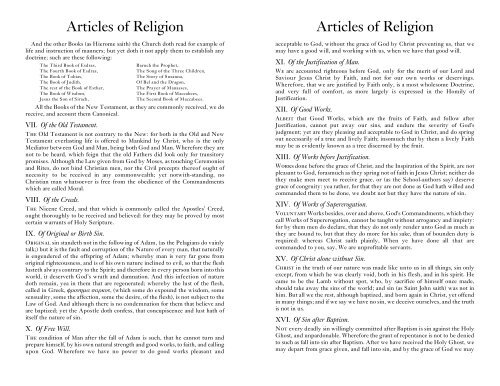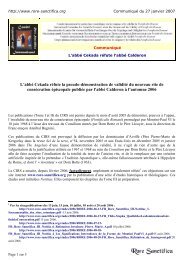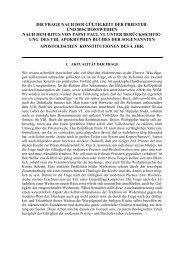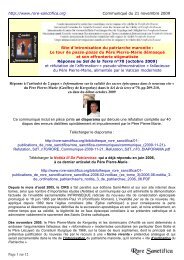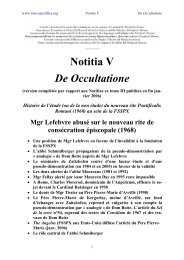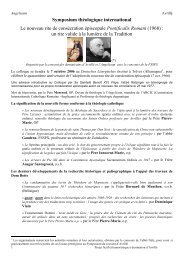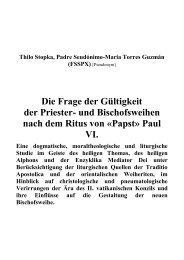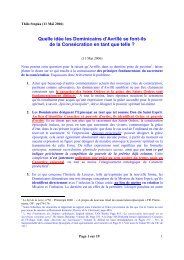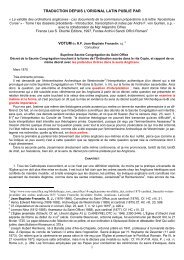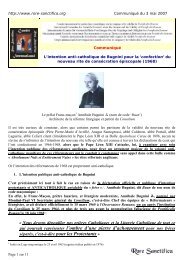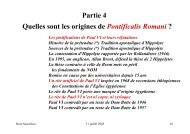The 1928 Book of Common Prayer, The Standard ... - Rore Sanctifica
The 1928 Book of Common Prayer, The Standard ... - Rore Sanctifica
The 1928 Book of Common Prayer, The Standard ... - Rore Sanctifica
You also want an ePaper? Increase the reach of your titles
YUMPU automatically turns print PDFs into web optimized ePapers that Google loves.
Articles <strong>of</strong> Religion<br />
And the other <strong>Book</strong>s (as Hierome saith) the Church doth read for example <strong>of</strong><br />
life and instruction <strong>of</strong> manners; but yet doth it not apply them to establish any<br />
doctrine; such are these following:<br />
<strong>The</strong> Third <strong>Book</strong> <strong>of</strong> Esdras,<br />
<strong>The</strong> Fourth <strong>Book</strong> <strong>of</strong> Esdras,<br />
<strong>The</strong> <strong>Book</strong> <strong>of</strong> Tobias,<br />
<strong>The</strong> <strong>Book</strong> <strong>of</strong> Judith,<br />
<strong>The</strong> rest <strong>of</strong> the <strong>Book</strong> <strong>of</strong> Esther,<br />
<strong>The</strong> <strong>Book</strong> <strong>of</strong> Wisdom,<br />
Jesus the Son <strong>of</strong> Sirach,<br />
Baruch the Prophet,<br />
<strong>The</strong> Song <strong>of</strong> the Three Children,<br />
<strong>The</strong> Story <strong>of</strong> Susanna,<br />
Of Bel and the Dragon,<br />
<strong>The</strong> <strong>Prayer</strong> <strong>of</strong> Manasses,<br />
<strong>The</strong> First <strong>Book</strong> <strong>of</strong> Maccabees,<br />
<strong>The</strong> Second <strong>Book</strong> <strong>of</strong> Maccabees.<br />
All the <strong>Book</strong>s <strong>of</strong> the New Testament, as they are commonly received, we do<br />
receive, and account them Canonical.<br />
VII. Of the Old Testament.<br />
<strong>The</strong> Old Testament is not contrary to the New: for both in the Old and New<br />
Testament everlasting life is <strong>of</strong>fered to Mankind by Christ, who is the only<br />
Mediator between God and Man, being both God and Man. Wherefore they are<br />
not to be heard, which feign that the old Fathers did look only for transitory<br />
promises. Although the Law given from God by Moses, as touching Ceremonies<br />
and Rites, do not bind Christian men, nor the Civil precepts there<strong>of</strong> ought <strong>of</strong><br />
necessity to be received in any commonwealth; yet notwith-standing, no<br />
Christian man whatsoever is free from the obedience <strong>of</strong> the Commandments<br />
which are called Moral.<br />
VIII. Of the Creeds.<br />
<strong>The</strong> Nicene Creed, and that which is commonly called the Apostles’ Creed,<br />
ought thoroughly to be received and believed: for they may be proved by most<br />
certain warrants <strong>of</strong> Holy Scripture.<br />
IX. Of Original or Birth Sin.<br />
Original sin standeth not in the following <strong>of</strong> Adam, (as the Pelagians do vainly<br />
talk;) but it is the fault and corruption <strong>of</strong> the Nature <strong>of</strong> every man, that naturally<br />
is engendered <strong>of</strong> the <strong>of</strong>fspring <strong>of</strong> Adam; whereby man is very far gone from<br />
original righteousness, and is <strong>of</strong> his own nature inclined to evil, so that the flesh<br />
lusteth always contrary to the Spirit; and therefore in every person born into this<br />
world, it deserveth God’s wrath and damnation. And this infection <strong>of</strong> nature<br />
doth remain, yea in them that are regenerated; whereby the lust <strong>of</strong> the flesh,<br />
called in Greek, , (which some do expound the wisdom, some<br />
sensuality, some the affection, some the desire, <strong>of</strong> the flesh), is not subject to the<br />
Law <strong>of</strong> God. And although there is no condemnation for them that believe and<br />
are baptized; yet the Apostle doth confess, that concupiscence and lust hath <strong>of</strong><br />
itself the nature <strong>of</strong> sin.<br />
X. Of Free Will.<br />
<strong>The</strong> condition <strong>of</strong> Man after the fall <strong>of</strong> Adam is such, that he cannot turn and<br />
prepare himself, by his own natural strength and good works, to faith, and calling<br />
upon God. Wherefore we have no power to do good works pleasant and<br />
Articles <strong>of</strong> Religion<br />
acceptable to God, without the grace <strong>of</strong> God by Christ preventing us, that we<br />
may have a good will, and working with us, when we have that good will.<br />
XI. Of the Justification <strong>of</strong> Man.<br />
We are accounted righteous before God, only for the merit <strong>of</strong> our Lord and<br />
Saviour Jesus Christ by Faith, and not for our own works or deservings.<br />
Wherefore, that we are justified by Faith only, is a most wholesome Doctrine,<br />
and very full <strong>of</strong> comfort, as more largely is expressed in the Homily <strong>of</strong><br />
Justification.<br />
XII. Of Good Works.<br />
Albeit that Good Works, which are the fruits <strong>of</strong> Faith, and follow after<br />
Justification, cannot put away our sins, and endure the severity <strong>of</strong> God's<br />
judgment; yet are they pleasing and acceptable to God in Christ, and do spring<br />
out necessarily <strong>of</strong> a true and lively Faith; insomuch that by them a lively Faith<br />
may be as evidently known as a tree discerned by the fruit.<br />
XIII. Of Works before Justification.<br />
Works done before the grace <strong>of</strong> Christ, and the Inspiration <strong>of</strong> the Spirit, are not<br />
pleasant to God, forasmuch as they spring not <strong>of</strong> faith in Jesus Christ; neither do<br />
they make men meet to receive grace, or (as the School-authors say) deserve<br />
grace <strong>of</strong> congruity: yea rather, for that they are not done as God hath willed and<br />
commanded them to be done, we doubt not but they have the nature <strong>of</strong> sin.<br />
XIV. Of Works <strong>of</strong> Supererogation.<br />
Voluntary Works besides, over and above, God's Commandments, which they<br />
call Works <strong>of</strong> Supererogation, cannot be taught without arrogancy and impiety:<br />
for by them men do declare, that they do not only render unto God as much as<br />
they are bound to, but that they do more for his sake, than <strong>of</strong> bounden duty is<br />
required: whereas Christ saith plainly, When ye have done all that are<br />
commanded to you, say, We are unpr<strong>of</strong>itable servants.<br />
XV. Of Christ alone without Sin.<br />
Christ in the truth <strong>of</strong> our nature was made like unto us in all things, sin only<br />
except, from which he was clearly void, both in his flesh, and in his spirit. He<br />
came to be the Lamb without spot, who, by sacrifice <strong>of</strong> himself once made,<br />
should take away the sins <strong>of</strong> the world; and sin (as Saint John saith) was not in<br />
him. But all we the rest, although baptized, and born again in Christ, yet <strong>of</strong>fend<br />
in many things; and if we say we have no sin, we deceive ourselves, and the truth<br />
is not in us.<br />
XVI. Of Sin after Baptism.<br />
Not every deadly sin willingly committed after Baptism is sin against the Holy<br />
Ghost, and unpardonable. Wherefore the grant <strong>of</strong> repentance is not to be denied<br />
to such as fall into sin after Baptism. After we have received the Holy Ghost, we<br />
may depart from grace given, and fall into sin, and by the grace <strong>of</strong> God we may


